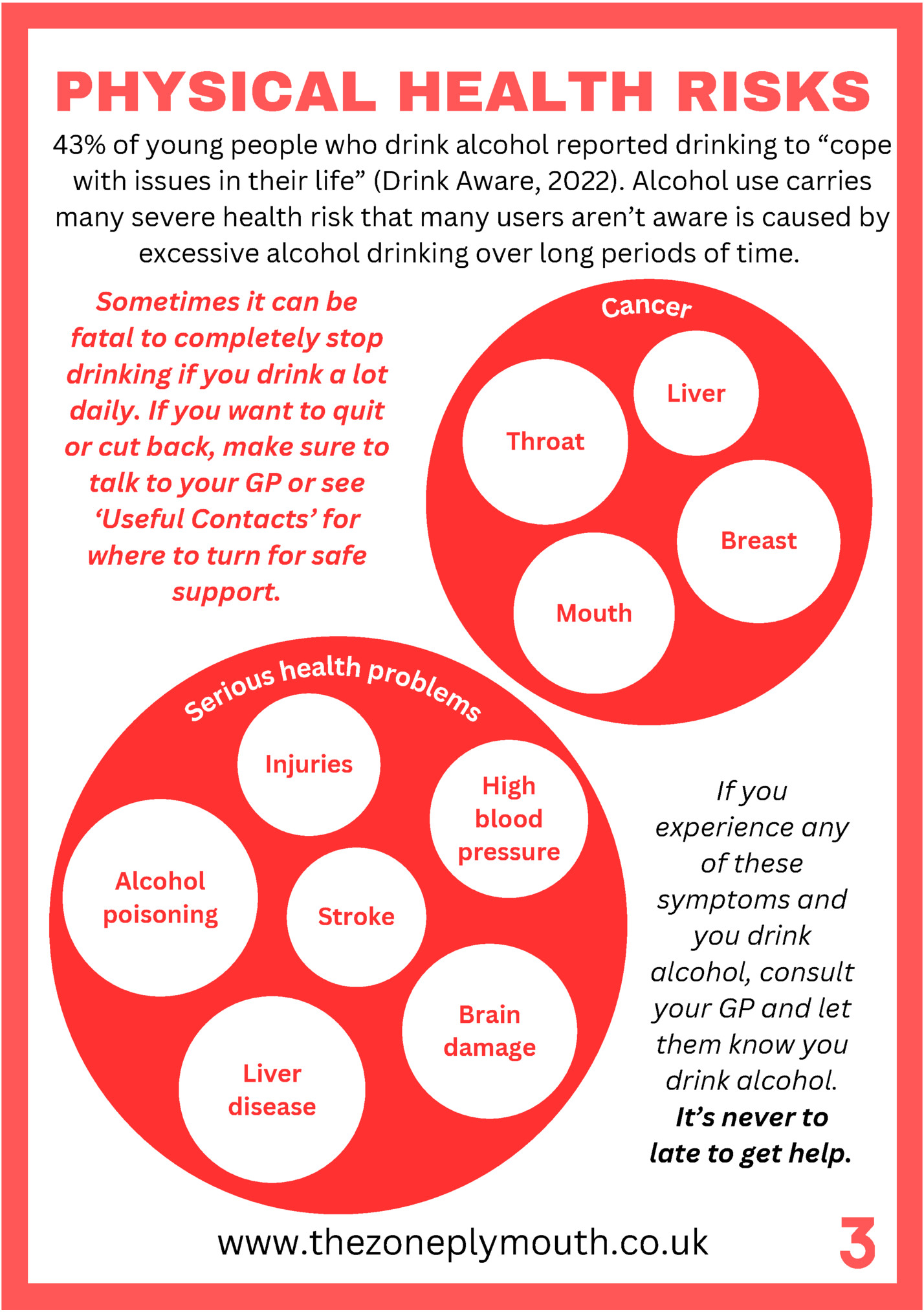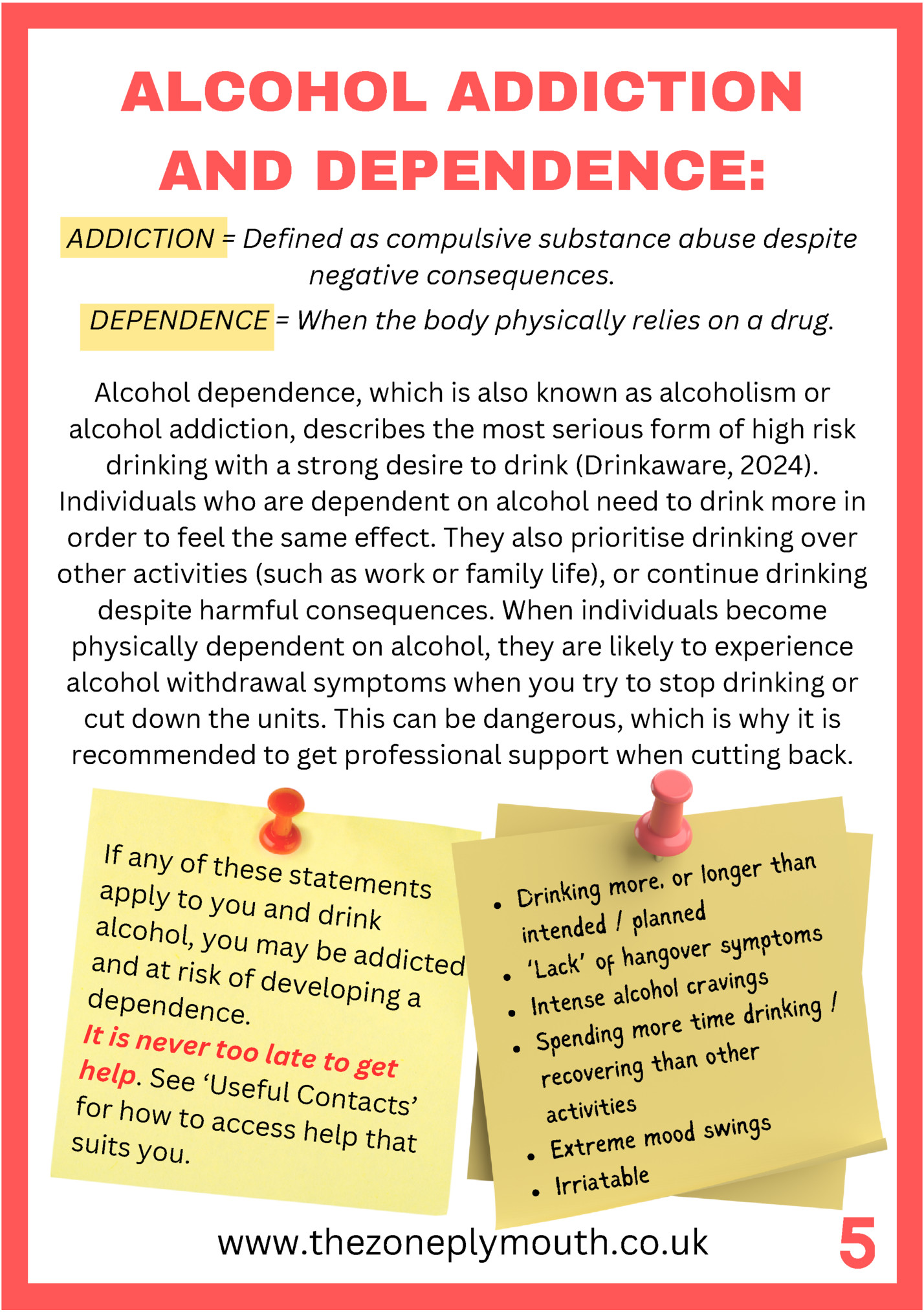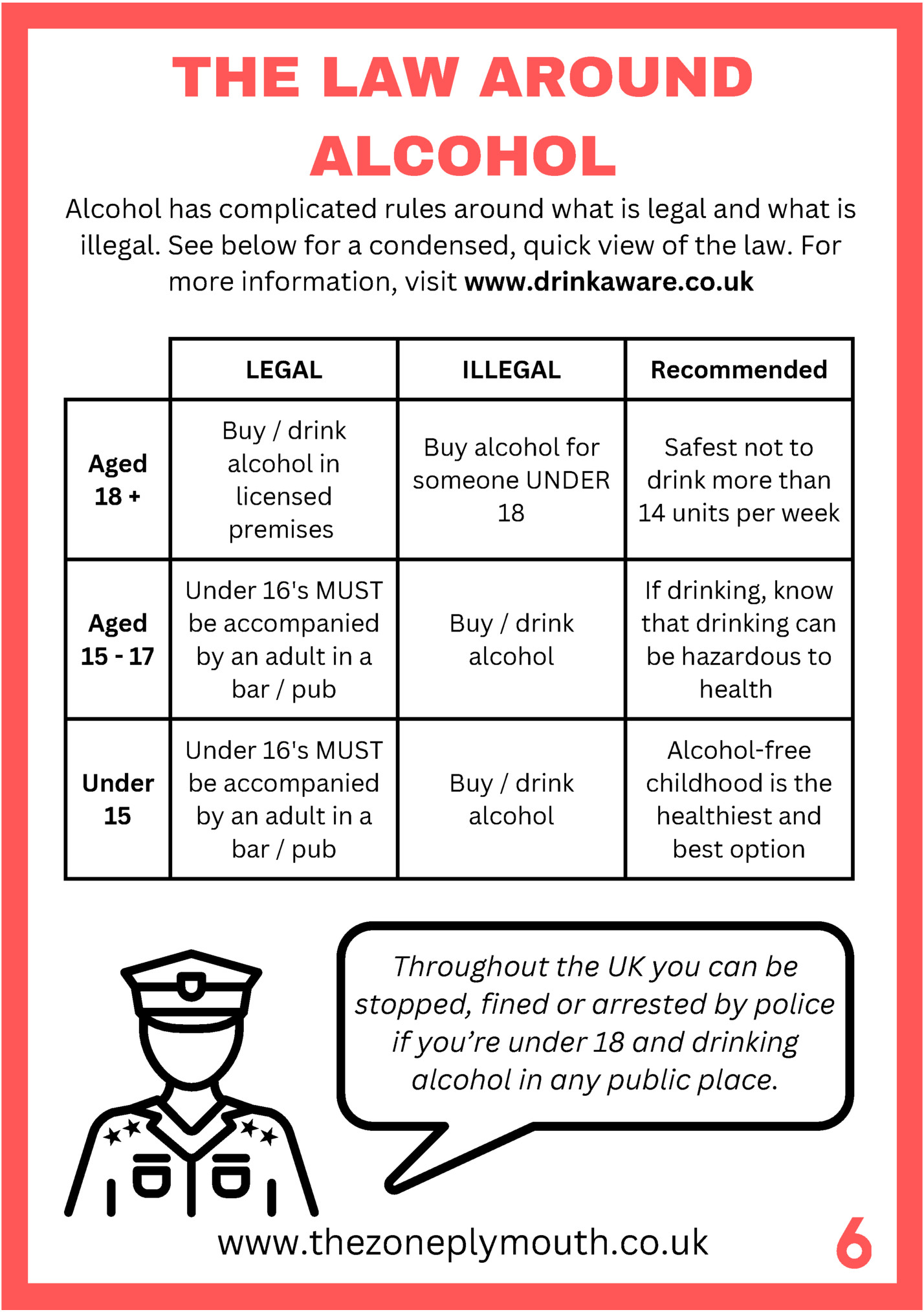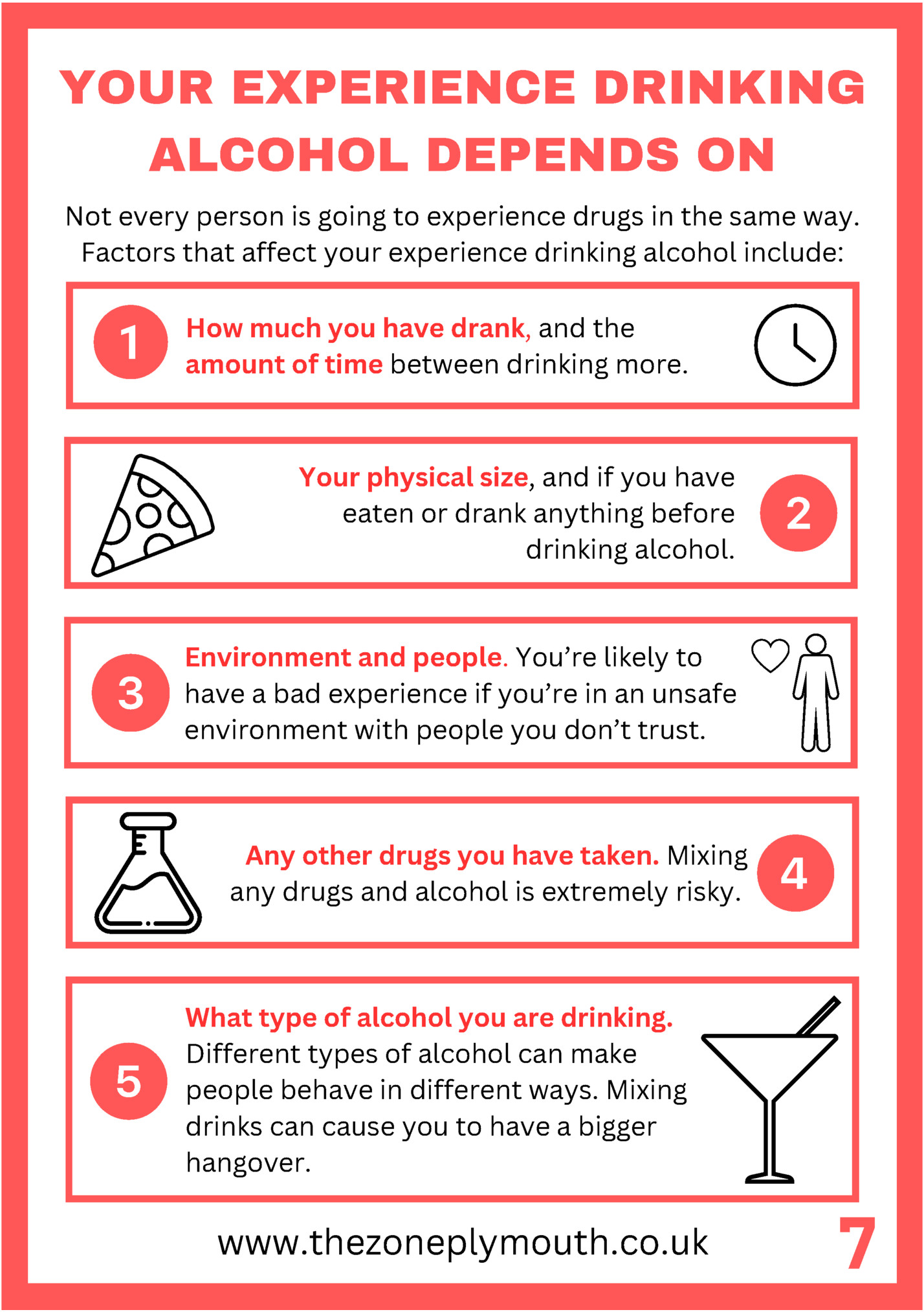ALCOHOL SCAN THE QR CODE FOR MORE INFORMATION ON OUR WEBSITE Version 1 - Published: June 2024 - Review Due: June 2025 - Charity No. 1051757

What is alcohol?....................................................................1 How is it drank?.....................................................................1 How does alcohol make you feel?......................................2 Physical Health Risks...........................................................3 Mental Health Risks.............................................................4 Alcohol Addiction and Dependence..................................5 The Law Around Alcohol......................................................6 Your Experience On Alcohol Depends On..........................7 Useful Contacts / Getting Help...........................................8 References.............................................................................9 www.thezoneplymouth.co.uk

Alcohol in drinks is a specific small molecule called ‘ethanol’ which makes you ‘drunk’ and affects your body every time you drink. When you drink alcohol, ethanol molecules are absorbed into your blood and travel to all parts of the body, including the brain. Alcohol causes chemical changes in the brain by suppressing normal activity, meaning it has a depressant effect. HOW IS IT DRANK? BEERS / LAGERS / CIDERS = Normally served as a ‘pint’ or ‘half pint’. Can buy then in cans or bottles. WINE = This includes red wines, white wines, rose and sparkling wines. Normally served as a ‘half glass’, ‘full glass’ or ‘whole bottle’. SPIRITS = This includes rum, vodka, gin, whisky, tequila and brandy. Spirits are usually served as a ‘shot’, or mixed with a soft drink such as lemonade or tonic. PREMIXED DRINKS = Also known as ‘alcopops’, these are drinks that have pre-mixed alcohol and mixer (usually fruit flavoured). www.thezoneplymouth.co.uk

MAKE YOU FEEL? Small amounts of alcohol can make you feel sociable, but too much can cause you to have a hangover the next day and potentially have a patchy memory from drinking. Too much alcohol in a single session coud put the user in a coma, or even kill the user (see ‘Your experience on alcohol depends on...’ for more). EFFECTS RISKS May become sociable and chatty Slurred speech Reduced feelings of anxiety Lack of co-ordination Exaggeration of what mood you’re in Raised testosterone (aggression) Can increase sex drive Blurred vision Although it's legal for people aged 18 and over to buy and drink alcohol, that doesn't mean it's safe. Drinking a lot of alcohol (more than 6-8 units) will make you intoxicated (drunk). The more you drink in a sitting, the more your judgement will be affected, and this can lead to doing things or taking risks that you otherwise wouldn’t. www.thezoneplymouth.co.uk

43% of young people who drink alcohol reported drinking to “cope with issues in their life” (Drink Aware, 2022). Alcohol use carries many severe health risk that many users aren’t aware is caused by excessive alcohol drinking over long periods of time. Sometimes it can be fatal to completely stop drinking if you drink a lot daily. If you want to quit or cut back, make sure to talk to your GP or see ‘Useful Contacts’ for where to turn for safe support. Cancer Liver Throat Breast Mouth s health proble iou ms r Se Injuries Alcohol poisoning High blood pressure Stroke Liver disease Brain damage If you experience any of these symptoms and you drink alcohol, consult your GP and let them know you drink alcohol. It’s never to late to get help. www.thezoneplymouth.co.uk

As with any drug (defined as ‘a substance which has a physiological effect when ingested or introduced into the body’), alcohol alters your brain from it’s natural state which in turn will effect your mental health. L HEALTH RIS NTA KS ME Suicidal thoughts Disturbed sleep Stress Psychosis Depression Anger Anxiety see ‘Useful Contacts’ if you are struggling with your mental health www.thezoneplymouth.co.uk

AND DEPENDENCE: ADDICTION = Defined as compulsive substance abuse despite negative consequences. DEPENDENCE = When the body physically relies on a drug. Alcohol dependence, which is also known as alcoholism or alcohol addiction, describes the most serious form of high risk drinking with a strong desire to drink (Drinkaware, 2024). Individuals who are dependent on alcohol need to drink more in order to feel the same effect. They also prioritise drinking over other activities (such as work or family life), or continue drinking despite harmful consequences. When individuals become physically dependent on alcohol, they are likely to experience alcohol withdrawal symptoms when you try to stop drinking or cut down the units. This can be dangerous, which is why it is recommended to get professional support when cutting back. If any of t hese state ments apply to y ou and dr ink alcohol, y ou may be addicted and at risk of develo ping a dependen ce. It is never too late t o get help. See ‘Useful Co ntacts’ for how to access he lp that suits you. n longer tha g m o r e, o r Drinkin planned intended / y m p to m s han g o v er s ‘Lack’ of ol cravings ense alcoh Int drinking / more time Spending than o ther recovering activities ood swings E x tr em e m Irriatable www.thezoneplymouth.co.uk

ALCOHOL Alcohol has complicated rules around what is legal and what is illegal. See below for a condensed, quick view of the law. For more information, visit www.drinkaware.co.uk LEGAL ILLEGAL Recommended Aged 18 + Buy / drink alcohol in licensed premises Buy alcohol for someone UNDER 18 Safest not to drink more than 14 units per week Aged 15 - 17 Under 16's MUST be accompanied by an adult in a bar / pub Buy / drink alcohol If drinking, know that drinking can be hazardous to health Under 15 Under 16's MUST be accompanied by an adult in a bar / pub Buy / drink alcohol Alcohol-free childhood is the healthiest and best option Throughout the UK you can be stopped, fined or arrested by police if you’re under 18 and drinking alcohol in any public place. www.thezoneplymouth.co.uk

ALCOHOL DEPENDS ON Not every person is going to experience drugs in the same way. Factors that affect your experience drinking alcohol include: How much you have drank, and the amount of time between drinking more. Your physical size, and if you have eaten or drank anything before drinking alcohol. Environment and people. You’re likely to have a bad experience if you’re in an unsafe environment with people you don’t trust. Any other drugs you have taken. Mixing any drugs and alcohol is extremely risky. What type of alcohol you are drinking. Different types of alcohol can make people behave in different ways. Mixing drinks can cause you to have a bigger hangover. www.thezoneplymouth.co.uk

Fleepit Digital © 2021